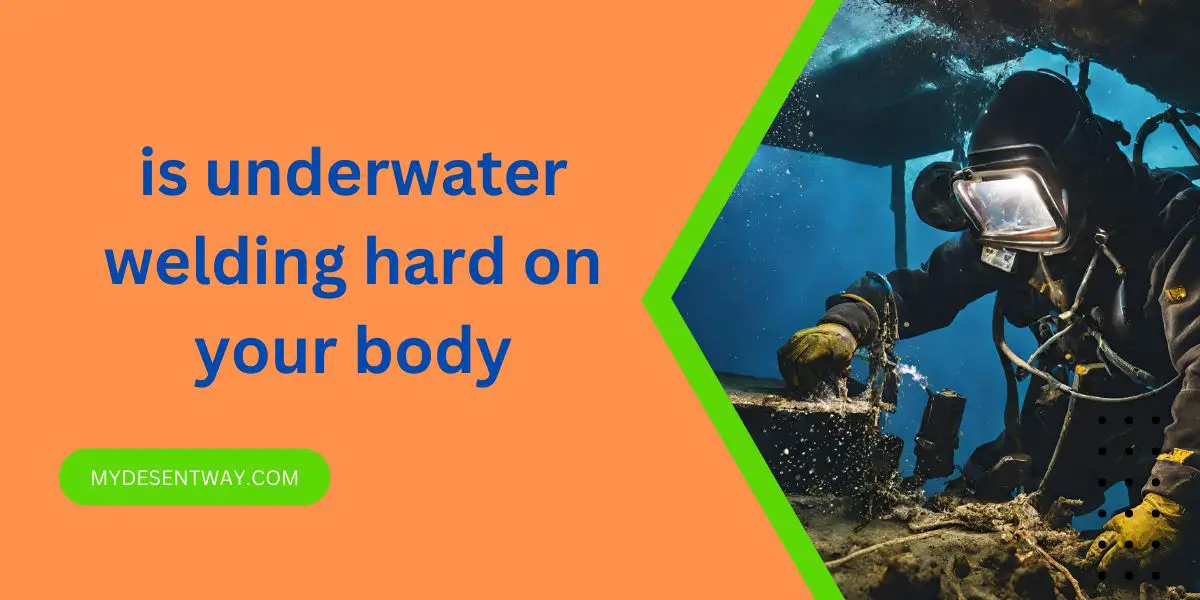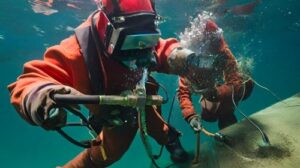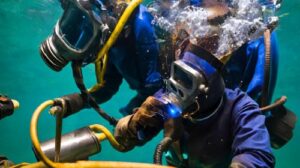Table of Contents
Is underwater welding hard on your body? Dive into the grueling realities
Underwater welding demands a unique blend of physical prowess and mental resilience. While the profession holds allure and challenges, its impact on the body, both physically and mentally, necessitates strict adherence to safety measures and proactive steps to minimize strain and overexertion
1. The Physical Demands of Underwater Welding
-
Physical Challenges Faced by Underwater Welders
Engaging in underwater welding places immense strain on the body. The cumbersome equipment, coupled with the resistance of water, amplifies the physical effort required. The constant struggle against buoyancy, handling heavy gear, and maintaining stability in the water leads to a tremendous toll on muscles and joints.
-
Impact on Muscles and Joints
The repetitive motions underwater, often in awkward positions, can lead to muscle fatigue, strains, and even long-term joint issues. Over time, musculoskeletal issues might arise from the pressure and strain placed on the limbs when handling welding equipment.
-
Effects on Respiratory System
Additionally, the environment underwater challenges the respiratory system. Welding in confined spaces introduces various gases and fumes, making breathing difficult and posing the risk of respiratory issues.
2. Mental Challenges and Stressors
-
Psychological Stress in Underwater Welding
While the physical strain is evident, the mental challenges are equally demanding. The isolation in the deep waters, coupled with the high-pressure environment, creates psychological stress. The immense focus and precision required for welding tasks demand mental resilience, leading to mental fatigue and heightened stress levels.
-
Coping with Isolation and Pressure
The solitary nature of underwater welding can be mentally taxing. Dealing with isolation for prolonged periods and managing the pressure to perform flawlessly add layers of stress that impact mental well-being.
-
Mental Fatigue and Concentration
The demanding nature of the job requires unwavering concentration. Mental fatigue sets in due to extended periods spent underwater, affecting cognitive functions and increasing the risk of errors.
3. Safety Measures and Precautions
-
Safety Equipment and Protocols
To mitigate the physical toll, stringent safety measures are indispensable. To protect yourself from the dangerous effects of the underwater environment, you need to wear the right safety gear, like diving suits, caps, and breathing gear.
-
Training and Preparation
Extensive training and preparation are crucial to ensure the well-being of underwater welders. Comprehensive training not only hones welding skills but also educates on safety protocols and the importance of adhering to them.
-
Avoiding Health Risks
Implementing best practices and adhering to safety guidelines is paramount. Avoiding prolonged exposure to hazardous environments and maintaining proper equipment functionality significantly reduces health risks.
4. Tips for Minimizing Strain and Overexertion
-
Physical Conditioning and Exercise
Physical conditioning before entering the profession helps in building endurance and resilience. Engaging in targeted exercises and stretches aids in minimizing strain on the body during underwater welding tasks.
-
Ergonomic Techniques
Employing ergonomic techniques while handling equipment and maintaining proper posture underwater reduces the risk of musculoskeletal issues.
-
Balancing Work and Rest
Striking a balance between work and rest is crucial. Adequate rest intervals between work sessions aid in recuperation and prevent overexertion.
Conclusion
Underwater welding demands a unique blend of physical prowess and mental resilience. While the profession holds allure and challenges, its impact on the body, both physically and mentally, necessitates strict adherence to safety measures and proactive steps to minimize strain and overexertion.
FAQs: about is underwater welding hard on your body
Is underwater welding dangerous for health?
Underwater welding poses risks to health due to physical strain, exposure to confined spaces, and handling of equipment. However, with proper safety measures, risks can be mitigated.
How does mental stress affect underwater welders?
Mental stress in underwater welding arises from isolation, high-pressure environments, and the need for intense focus, leading to mental fatigue and increased stress levels
Can physical conditioning help in underwater welding?
Yes, physical conditioning through targeted exercises and proper training can enhance endurance and reduce the risk of physical strain in underwater welding.
What safety equipment is necessary for underwater welders?
Essential safety equipment includes diving suits, helmets, breathing apparatus, and tools to ensure protection against the underwater environment.
Are there any long-term health risks associated with underwater welding?
Prolonged exposure to the underwater environment and repetitive motions can lead to musculoskeletal issues and respiratory problems if safety precautions are not followed diligently.





1 thought on “Is Underwater Welding Hard on Your Body? Discover Now! 💥”